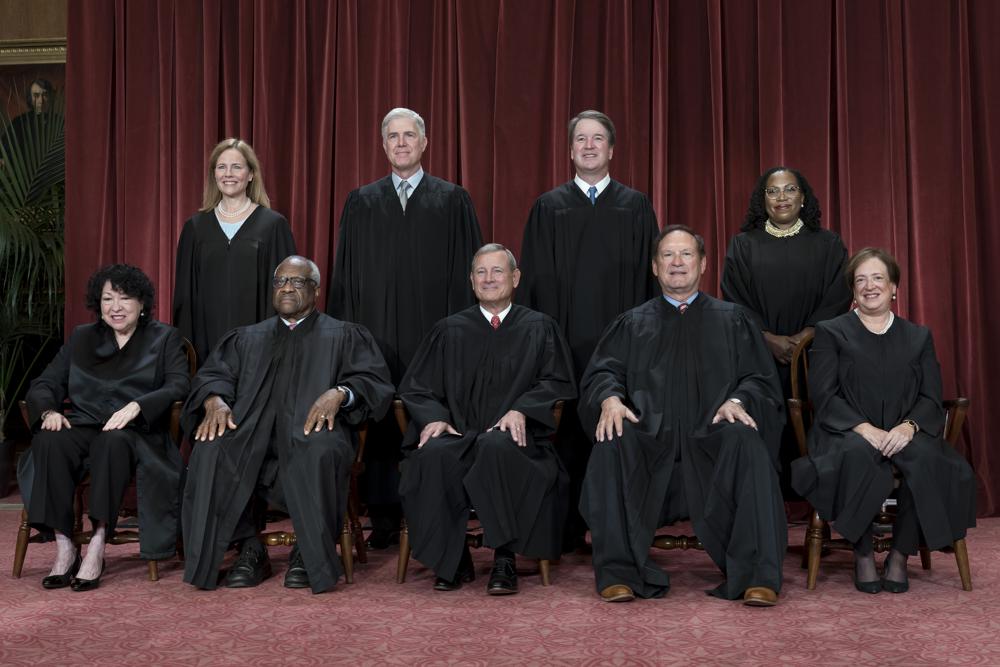Justice Ketanji Brown Jackson’s concern about abortion drug case hints at Supreme Court ruling outcome
U.S. Rep. Jasmine Crockett, D-Texas, believes the court will rule against the anti-abortion doctors because of their “very sloppy” presentation […] The post Justice Ketanji Brown Jackson’s concern about abortion drug case hints at Supreme Court ruling outcome appeared first on TheGrio.

U.S. Rep. Jasmine Crockett, D-Texas, believes the court will rule against the anti-abortion doctors because of their “very sloppy” presentation and lack of evidence to support placing new limits on the abortion pill.
Based on nearly two hours of oral arguments on Tuesday, a majority of the U.S. Supreme Court justices appear skeptical of the plaintiffs’ arguments in the case seeking to ban the FDA-approved abortion drug, mifepristone, which would have implications for Black and marginalized communities.
The justices questioned whether the plaintiffs, Alliance For Hippocratic Medicine, had “standing” to bring the case – or, in other words, proof of injury – against the Federal Drug Administration and Danco Laboratories LLC, which is the pharmaceutical distributor of the abortion pill.
While questioning the plaintiffs, Justice Ketanji Brown Jackson said she was concerned there “is a significant mismatch … between the claimed injury and the remedy that’s being sought.”
Jackson argued that the injury the plaintiffs allege is a “conscience injury that they are being forced to” carry out abortion procedures when they oppose taking part in the medical practice.
The plaintiffs, anti-abortion doctors, contend that the court should either place a nationwide injunction or new restrictions on mifepristone to prevent them from being forced to treat abortion patients in emergency situations. However, federal law already grants doctors an exemption to opt out of providing abortion care.
U.S. Rep. Jasmine Crockett, D-Texas, told theGrio the case should have never “made it past summary judgment on the trial level.” The Texas lawmaker said the plaintiffs “have not been aggrieved or actually harmed to be able to bring this suit.”

Crockett believes the court will rule against the anti-abortion doctors because of their “very sloppy” presentation and lack of evidence to support placing new limits on the abortion pill.
Julia Kaye, senior staff attorney with the American Civil Liberties Union Reproductive Freedom Project, agrees with Crockett, telling theGrio that if the high court were to rule in favor of the anti-abortion doctors, it would “dramatically reduce where and how mifepristone is available.”
In particular, Kaye, who argued the plaintiffs want to see abortion banned nationwide, said it would “greatly” impact marginalized communities.
“It is now used in more than half of all U.S. abortions,” Kaye said of the abortion drug. She noted that a ruling against mifepristone would disproportionately impact “people of color, low-income patients, folks living in rural areas, and women in abusive relationships who often receive the pill by mail via telehealth.”
She explained, “These groups are unlikely to overcome the enormous transportation, childcare, and other costs associated with having to make a multi-hour-long trip just to be handed a pill.”
“They brought this lawsuit to strip away other people’s access to a safe and effective FDA-approved medication,” said Kaye. “It’s simply outrageous.”
Kaye noted that the anti-abortion doctors could not “provide a single example of a time when they had to provide abortion care that violated their conscience, adding, “They only offered hypotheticals and scare tactics.”

Aadika Singh, senior reproductive justice attorney with the Public Rights Project, told theGrio, “What’s happening here is a really disturbing trend to undermine the rule of law and principles that give our legal system stability and fairness.”
In recent months, the Department of Justice said that mifepristone is the “best method” to terminate early pregnancies, and the FDA emphasized that the drug is safe to use.
The FDA approved the drug in 2000 to be paired with another drug, misoprostol, to terminate a pregnancy up to 10 weeks. The agency states that a patient who would like to abort a fetus would first take mifepristone orally. The abortion pill would dilate the cervix and prevent the hormone progesterone from sustaining the pregnancy.
After 24-48 hours, the patient would then place misoprostol somewhere on the body, and it would dissolve on its own to continue the process of ending the pregnancy.
The drug has grown in popularity since the U.S. Supreme Court overturned Roe v. Wade in 2022 and granted authority to states to enact their own anti-abortion laws. In 2023, Republican-led states like Texas, Alabama, Idaho, Florida, and Georgia passed some of the nation’s strictest anti-abortion statutes.

Since then, patients wishing to terminate their pregnancies have obtained mifepristone by mail or have traveled to states that have not enacted abortion bans to obtain the pill.
The justices are expected to render a ruling in this case by late June.
Kaye said she hopes the court will dismiss the “outrageous lawsuit.” However, even if the court does toss out the case, she said “extremist anti-abortion politicians” have promised that they will find ways to prevent the public from accessing the pill.
She warned, “They will file copycat lawsuits to continue this effort to restrict access to this medication in every state in the country.”
Never miss a beat: Get our daily stories straight to your inbox with theGrio’s newsletter.
The post Justice Ketanji Brown Jackson’s concern about abortion drug case hints at Supreme Court ruling outcome appeared first on TheGrio.












